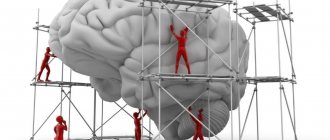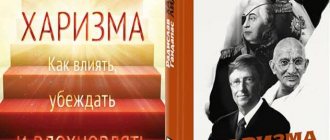We have all come across the expression “IQ” more than once. This term can be heard especially often when it comes to the mental and intellectual development of a person. Actually, “IQ” means intelligence quotient. And today we will talk in detail about what it is and with what, so to speak, it is “eaten.”
The term “intelligence quotient” comes from the English phrase “intelligence quotient” and is a quantitative assessment of the level of intelligence of a person, i.e. his level of intelligence compared to the level of intelligence of the average person of the same age. Specialized tests are used to determine IQ. But we'll talk about tests a little later, but for now let's delve a little deeper into history.
What is intelligence
Intelligence is the ability to recognize new situations, learn, understand and apply abstract concepts in life (see individual properties of objects and phenomena), use one’s knowledge in accordance with the requirements of the environment.
In the Big Psychological Dictionary the word means (English intelligence; from Latin intellectus - understanding, knowledge)
- general ability to cognition and problem solving, which determines the success of any activity and underlies other abilities;
- the system of all cognitive abilities of an individual: sensation, perception, memory, representation, thinking, imagination;
- ability to solve problems without trial and error “in the head.”
Connection with thinking
Thinking and intelligence are terms that are close in content to each other. These concepts are the hallmarks of a person.
In everyday speech, the concept of intelligence will correspond to the phrase “mental abilities.” The definition of intelligence is the totality of a person’s mental abilities that ensure the success of mental activity.
Thinking is a higher psychological process that is associated with speech, with constant learning of new things, everyday discoveries, and creative activity.
From this we can conclude that thinking is included in the concept of intelligence, that intelligence is a broader concept, with a complex, branched structure.
Why an IQ test is not an indicator of intelligence
IQ tests were widely used until the end of the twentieth century. This, first of all, simplified the selection process and made it possible to evaluate a person quickly and “scientifically.” But how objective?
If you analyze the history of intelligence research and the creation of IQ tests, you will notice that the desire to control people runs through it as a red thread.
Such tests allegedly decided who you were and how much knowledge you could acquire, whether you were worthy of applying it in practice, and whether you were suitable for procreation. An IQ test is like a burned-out brand indicating your place.
But what if you still try to look at “subject no...” as a real person? You can find a master of words with a lively mind, an artist with a boundless imagination, a C-level millionaire with unconventional thinking. And all of them can fail the IQ test, finding themselves below the line of imaginary intelligence.
Main functions
General intelligence performs various functions and tasks.
| Function of intelligence. | An example from life. |
| Knowledge of the surrounding world as a whole. | A child is born, constantly learns new things, studies the world, life. |
| Formation of goals and objectives, overcoming obstacles that arise along the way. | The student set himself the goal of studying for straight A's. He was not good at chemistry, but with the help of intellectual effort and regular study, he was able to understand the material. |
| The ability to predict events and predict the results of your actions. | A person understands that if he is rude to others, he will not be respected, so he tries to communicate politely. |
| Managing the world around us, creating new realities. | German inventor Karl Benz invented the car, and before people could not imagine anything like it. |
| The ability to accumulate experience in the process of activity and transfer it to others. | The man learned to read and write and taught his children to do so. |
| The ability to occupy a certain position in society. | The man studied well at school and college and became an engineer. Thanks to the totality of his mental abilities, he was able to occupy a high position, receive respect among colleagues, a good reference from the employer and recommendations. |
| Development of existing skills. | The student learned to solve addition and subtraction problems. Thanks to intellectual efforts, on the basis of this, he mastered division and multiplication, and solving equations. |
| An opportunity to show your talent. | The girl studied music since childhood, which allowed her to take a prize in the city talent competition. |
| Self-affirmation, realization of oneself as an individual. | Intelligence helped the aspiring writer create a high-quality literary work and make a name for himself. |
History and theories - who introduced the concept of intelligence
The term “intelligence” was first used in the 20th century, introduced by the German psychologist William Stern.
Alfred Bene created IQ tests. The main task is to identify the level of intelligence of schoolchildren, the properties of students’ intelligence, to understand which of them is lagging behind in the program and who needs additional help. The test began to be used very widely, and various variants appeared. Today, such testing is disputed by scientists; not everyone recognizes its reliability and effectiveness.
What do you think about intelligence testing? Have you ever undergone such tests at least once in your life? Share your opinion and experience in the comments.
There are many theories of intelligence, but only a few are the most popular and widespread.
| Theories of intelligence. | What is its essence? |
| General theory of intelligence. | Author: Charles Spearman. Believes that intelligence has a two-phase character. Consists of general intelligence and g-factor. The essence of the concept is that there is a connection between certain types of intellectual activity. For example, abilities in mathematics and music are related. If a person is bad at music, then it is more likely that his math skills are also quite mediocre. |
| Basic mental abilities. | Suggested by Louis Thurston. He analyzed the results of various mental ability tests and identified 7 main ones: associative memory, numerical abilities, speed of perception, reasoning, spatial visualization, verbal perception, fluency in words. |
| Piaget's theory of intelligence. | This is a step-by-step theory of development and mastery of the world around a child. Piaget disagrees that intelligence is an innate personality trait. The scientist believed that it could be developed as a result of biological maturation and contact with the environment. According to the theory of Piaget's stages, each child in intellectual development goes through certain stages, always the same (sensorimotor intelligence, pre-operational ideas, the period of concrete operations, the period of formal operations). |
| The theory of multiple intelligences. | Author: Howard Garner. He suggested that testing mental abilities based on IQ does not reflect the real picture of what is happening. In his opinion, a person has separate, multiple intelligences that do not depend on each other. According to Gardner, there are 7 types of intelligence: bodily-kinesthetic, interpersonal, intrapersonal, logical-mathematical, musical, naturalistic, verbal-linguistic, visual-spatial. |
| Triarchic theory of intelligence. | Creator: Robert Stenberg. Defines intelligence as the purposeful adaptation and formation of those qualities that are directly related to human life. Types of intelligence, in his opinion, should be considered as individual talents. The proof of the theory is that some people are talented in some ways, but do not demonstrate high abilities in other matters. According to Stenberg, there is a “successful intelligence”. It includes analytical, creative, practical abilities. |
| Theory of emotional intelligence. | Developed by Peter Salovey John Mayer. Emotional intelligence is the ability to control your emotions, understand the feelings of other people, and give appropriate names to emotions. Emotional intelligence includes empathy, self-awareness, self-management, social awareness, communication skills, relationship management skills. |
| Fluid and crystallized intelligence. | Author: Raymond Cattell. In his opinion, intelligence can be mobile and crystallized. Flexible intelligence helps to solve problems without resorting to previous knowledge and to use abstract thinking. The flexibility of the intellect increases as the child matures. After 20 years, this indicator declines; this is due to the psychology of intelligence and the amount of life experience. Crystallized intelligence uses existing knowledge and experience (specific facts, knowledge gained in school, muscle memory). |
Brief historical background
The term “intelligence quotient” was first coined in 1912 by the German psychologist and philosopher Wilhelm Stern. It was he who put forward the proposal to use the results of dividing a person’s mental age by chronological age as the main indicator of intellectual development. Four years later, in 1916, IQ was used for the first time in the Stanford-Benet intelligence scale.
Over time, people's interest in IQ tests became stronger, which led to the emergence of a huge number of various scales, among which there are often unsubstantiated ones. Based on this, today it is quite problematic to compare the results of different tests. But, despite the fact that the IQ indicator itself has begun to lose its value, a huge number of people around the world continue to take all kinds of tests to determine the level of their intellectual development.
Structure of human intelligence
The structure represents the following components of intelligence:
- general intelligence (a set of mental properties that ensure the success of any activity);
- verbal and nonverbal human intelligence (nonverbal intelligence is based on visual-effective thinking, verbal intelligence is based on the use of verbal and logical forms);
- private intellectual skills (school knowledge, level of general erudition, generalization, abstract thinking, etc.).
Intelligence levels
Intellectual level is the same IQ. According to the data obtained as a result of the survey, intelligence levels are presented in the table.
| Above 140 | A person has excellent creative abilities and can achieve significant success in various branches of scientific knowledge. They are known for their outstanding abilities and contribute to science and the development of society as a whole. Representatives: Bill Gates, Stephen Hawking. |
| From 131 to 140 | Very high levels of intelligence, only 3% of the human population possess them. They can be described as very gifted, successful people. They are also capable of achieving heights in science and creativity. Representatives: Nicole Kidman, Arnold Schwarznegger. |
| From 121 to 130 | The rate is above average, observed in 6% of the population. Such people are immediately visible in high schools and universities. Without much effort, they excel in all subjects, are active in social and creative activities, and receive honors diplomas and gold medals. In their chosen professions, such people reach special heights and successfully move up the career ladder. |
| From 111 to 120 | Representatives are very diligent and hardworking people who spend their entire lives trying to learn something new, learn, and develop. There are approximately 12% of such people. |
| From 101 to 110 | An average level of intelligence, which allows a person to achieve noticeable heights, but not great success. There is no need to be upset, because such intelligence can be developed and pumped up, just as athletes build muscle mass. |
| From 91 to 100 | Also average IQ. With due effort, such people are able to study well at school and graduate from university. As a future professional activity, they usually choose mid-level professions that do not require serious intellectual effort. |
| From 81 to 90 | Representatives of this level of intelligence do well or averagely at school. They rarely receive higher education; they prefer to confine themselves to a technical school or college. They work successfully in areas where they need to use physical activity and be able to work with their hands. |
| From 71 to 80 | People usually have mild mental retardation. They graduate from general education schools with average or satisfactory grades and can study in specialized schools. |
| From 51 to 70 | A more serious form of mental retardation, but such people can take care of themselves, perform work that does not require intellectual effort, and be full members of society. They study in specialized schools. |
| From 21 to 50 | This level of intelligence is characteristic of 2% of the population; it is characterized as severe dementia, an average degree of mental retardation. People are not trained, but can cope with basic household things. For more complex manipulations, they require the help of caregivers. |
| Up to 20 | A severe form of mental retardation, people are not amenable to training and education. They exist in their own world; in modern realities they cannot survive without the help of guardians. |
Theremin experiment
Lewis Terman undertook to study the connection between intelligence and productivity . Back in the 1920s, he tested thousands of California school students and found 1,528 “gifted” girls and boys. The average IQ of these children was 151, and 77 of them had scores between 177 and 200.
The “selected geniuses” were nicknamed “termites” and their successes were observed. Scientific, professional and personal achievements were recorded throughout life. And this is what happened: all the subjects graduated from high school, two thirds graduated from universities, hundreds published scientific and artistic works, 126 people received a doctorate. “Termites” became teachers, doctors, lawyers, and engineers. But the majority did not achieve outstanding results; women in almost half of the cases turned out to be housewives.
Theremin came to the conclusion: intelligence and achievements are not always interconnected.
Courses on the topic:
HR and recruiting
People Management
Alexandra Alkhimovich, Top manager with 10 years of experience (Luxoft)
HR and recruiting
HR Director
Ekaterina Gubareva, VP of HR, Global Geo Lead at SoftServe
But here's what's interesting: among the children who were not accepted into the "termite" group were William Shockley and Luis Alvarez . Their IQ scores did not reach the threshold score.
Shockley is a physicist and inventor. He created the bipolar transistor, won a Nobel Prize, received more than 90 patents and was included in Time magazine's list of the 100 most influential people of the 20th century.
Alvarez became one of the best experimental physicists of the twentieth century. He created the bubble chamber and received the Nobel Prize.
It turns out that the most reliable intellectual test is the test of time.
Signs of High Intelligence
High intelligence is most likely to be found in people who have the following skills, abilities, and qualities:
- a person’s ability not to be constantly distracted by extraneous things, to focus his attention on one thing, to devote himself completely to the task;
- nocturnal lifestyle, biorhythm - owl;
- easy adaptation to environmental conditions, the ability to quickly change one’s behavior depending on the situation;
- lack of fear of admitting ignorance of something (not knowing and not being able to is not scary, because you can learn it);
- curiosity, ability to admire;
- openness to all new ideas and opportunities, the ability to consider alternative solutions and points of view;
- the ability to enjoy being alone with oneself;
- good self-control, the ability to plan everything ahead, set specific goals;
- developed sense of humor;
- the ability to empathize, the ability to put oneself in the place of the interlocutor;
- the ability to see parallels and associations that others do not notice (for example, both a shoe and a pencil leave a mark);
- An intelligent person can be seen doing routine work, so he thinks about more important tasks;
- a sign of a high level of development - thoughts about the purpose, meaning of life, a conscious approach to what is happening.
Who, when and why began to measure the mind
The first to evaluate and divide people into “mentally gifted and deprived” was Francis Galton . His ideas were innovative and radical - Galton denied natural equality between people. He believed that intelligence and talent are hereditary and not acquired characteristics of a person.
Back in the 19th century, the researcher created the first “intellectual questionnaire” and soon founded his own doctrine - eugenics. It involved improving the gene pool through control by the authorities. Galton described a model of a utopian state where the population was examined - their physical and mental qualities were assessed. Those who did not “pass” were considered unfit for reproduction. If such people adhered to the ban, they were supported by the state, but if they violated it, forced emigration awaited them.
But the questionnaire presented by Galton bore little resemblance to modern IQ tests. The psychologist studied the mind and body with equal interest, looking for the connection between them. He believed that the foundation of mental data is developed sensory abilities: fine hearing, acute vision, color perception. Galton measured them. In addition, he recorded height, weight, head circumference, and also tested muscle strength, associative abilities and the ability to form judgments.
Galton measured the “mental potential” of 9 thousand people and came to the conclusion: the test results of the “intellectual elite” (scientists, judges, writers) were little superior to the data of ordinary people who were not outstanding in any way.
This is how human abilities began to be assessed more than 150 years ago.
What indicator indicates “backwardness”
A person's mental abilities may be reduced. A number of symptoms indicate this:
- inability or low ability to think in abstract categories (select);
- inability to generalize and systematize received information;
- lack of critical thinking;
- the habit of thinking specifically, narrowly;
- small, poor vocabulary;
- paucity of emotions;
- increased suggestibility, knowledge;
- remarkable stubbornness.
Is it possible to improve intelligence?
Human intelligence can be adjusted, it can be improved, enriched, and developed.
What factors influence mental abilities?
High intelligence is not always given by nature. Intelligence is influenced by many external factors.
Heredity and the structure of the brain affect a person’s thinking and intellectual arsenal. For example, the processing of information depends on how efficiently the frontal lobes work.
The child's intelligence is influenced by how the mother ate during pregnancy. If the mother ate properly and avoided bad habits, then with an increased probability she will give birth to an intelligent person.
If parents have the talent of education, then they will grow up an intellectually developed child. He will be interested in new knowledge, show interest, and study diligently.
Research shows that children who do not have siblings are more intellectually developed than children from large families. This is due to the fact that parents pay much more attention to one child and invest more in him than in several children.
If a child suffers from diseases such as Down syndrome or phenylketonuria, or has other developmental features, then the likelihood of intellectual retardation increases.
Age differences
The foundation of intelligence is laid between 5 and 7 years. Its full potential is revealed closer to the age of 20. But even after 20 years, intelligence can develop, but at a much slower pace.
A person’s mathematical abilities develop at the age of 30-35. If by this time he had not achieved significant success in mathematics, then now he is unlikely to achieve it.
Doctors and scientists in the natural sciences demonstrate their peak intelligence at 42-45 years of age.
Psychologists and philosophers reach their full potential closer to 50-55 years of age.
But there are also abilities that develop throughout life and can manifest themselves even in old age. These are artistic abilities that relate to different areas of art (dancing, painting, singing, acting).
Do intellectual abilities decline in older people?
Elderly people are susceptible to senile diseases that negatively affect the brain (sclerosis, dementia, senile dementia). But if you engage in your intellectual development, then you can maintain a lively and inquisitive mind until old age.
Gender differences
The intellectual differences between men and women have always been a subject of heated debate and discussion. Since ancient times, it was believed that women are less developed than men.
Laws and traditions did not allow women to engage in many activities, including intellectual ones. Because of this, the myth began that women are less developed in this regard than men. This practice also exists in countries where women are in a degraded position. Her intelligence is indeed lower, but the reason is banal - lack of opportunity to learn.
However, studies have shown that men's brains are no better than women's. Women are better able to understand some types of intellectual activity than men.
That is, differences in brain structure between men and women do not determine the degree of intelligence. Both a woman and a man can do the same job equally successfully.
Just because a man's brain weighs more does not make his intelligence sharper. Elevated hormone levels also have an ambiguous effect on intelligence; it can reduce or increase it.
Speaking abstractly, a man who has good intelligence is no different from a developed woman.
What do you think about the differences in intelligence between men and women? Share your thoughts in the comments.
Gender and age differences
The level of intelligence depends not only on the influence of external factors or genetics, but also on age and gender.
Scientists were able to establish an interesting pattern. If a child at 5–10 years old was distinguished by increased intelligence and intelligence, at 20, 30, 40 years old he will have developed mental abilities. This pattern does not work in all cases.
To understand how age affects mental abilities, you need to study the features of the relationship between these two indicators:
- IQ increases until age 18, slowing down during transition periods. The brain is busy solving other issues.
- From the age of 20, the development of mental abilities gradually slows down.
- Analytical, logical and arithmetic potential is revealed only by the age of 30.
- Medical knowledge is acquired between the ages of 40 and 45. Psychological teachings are realized after 50 years.
You also need to pay attention to art. It develops well at any age. Scientists could not identify any restrictions regarding this.
There is a constant debate in the world as to who is smarter - women or men. After conducting a large number of studies, scientists could not find a big difference in the relationship between intelligence and gender, but there is still a slight difference. It is noticeable in several aspects:
- The development of physical and mental characteristics in girls under 15 years of age occurs faster than in boys.
- Women develop better in the humanities, and men in the sciences.
Women are known for their unconventional thinking. Men tend to think logically.
Diagnostics and testing
It is customary to assess a person’s intelligence using various methods:
- Cattell's Intelligence Test. The questionnaire consists of 862 questions on various topics (personality, character, temperament, work, business, etc.).
- Guilford Social Intelligence Test. Makes it possible to assess a person’s communication skills and adaptability. Most questions are presented in the form of pictures.
- Wechsler test. The author of the test believed that it was worth moving away from the standard understanding of intelligence. There are many more factors that influence a person's intelligence. It is considered one of the most famous and used.
- Raven's progressive matrices test. Measures logical thinking and a person’s ability to process information.
- Amthauer Structure of Intelligence Test. Intelligence is measured as a set of psychological characteristics of a person. Consists of several parts and is devoted to different aspects of thinking. The purpose of the test is to determine the ability to create combinations, counting abilities, and the ability to concentrate on a goal.
- Bennett Test of Mechanical Comprehension. Evaluates a person’s level of technical preparedness, his ability to learn, and spatial thinking. 30 minutes are allotted for testing.
IQ
Intelligence quotient is the famous IQ, which today is most often detected using the Eysenck test. Used in schools, universities, and when applying for jobs. Allows you to identify a comprehensive assessment of mental development. The test subject will have to solve 40 tasks, the complexity of which gradually increases.
Criticism of IQ
IQ tests have been repeatedly criticized by scientists. Thus, Doctor of Physical and Mathematical Sciences, Academician of the Russian Academy of Sciences V. A. Vasiliev discovered that in Eysenck’s IQ tests, a significant part of the problems were composed incorrectly or the author’s solutions were incorrect. Here are Vasiliev’s statements on this matter:
“I ... decided to study the tests without haste, especially since their answers systematically did not coincide with mine in problems from my professional areas: logic and geometry. And I discovered that most of the test author’s decisions were incorrect. And in some cases, the subject can only guess the answer - it makes no sense to rely on logic.”
Based on this, it can be noted that IQ test tasks assess not only the abilities of logical, deductive thinking, but also inductive thinking. The rules for performing some IQ tests warn in advance that in some tasks the answers do not follow clearly from the task, and you need to choose the most reasonable or simple answer. This corresponds to many real life situations in which there is no clear answer.
“If a person answered the same way as Eysenck, then she is only demonstrating the standardization of her thinking, a quick and predictable reaction to a simple stimulus. A slightly less flat person will think a hundred times before answering... There are countless possible solutions to each such problem. The smarter you are, the more likely it is that your solution does not coincide with the author's. The practical meaning here is only one: for someone who gives the “correct” answer to tests, it will be easier to fit into the average education system and communicate with people who think the same way as him. In short, Eysenck tests ideal mediocrity."
Soviet psychologist Lev Semenovich Vygotsky showed in his works that a child’s current IQ says little about the prospects for further learning and mental development. In this regard, he introduced the concept of “zone of proximal development.” A similar joke says that IQ tests actually test a person's ability to solve these tests. This is not far from the truth. Essentially, the subject is required to solve certain problems in a certain way. The smarter a person really is, the more alternative solutions to those proposed by the creators of the test she will be able to offer.
How to increase IQ in an adult
To make your intelligence noticeably above average, it is important to maintain active brain activity, but do it correctly:
- Solve problems, equations, add and subtract large numbers in your head.
- Train your own memory (memorize poems, song lyrics, passages of prose works).
- Follow the basic rules of a healthy lifestyle (eat right, give up bad habits, play sports, walk in the fresh air more often).
- Find a balance between work and rest, give your brain a break, get enough sleep.
- Make a healthy daily habit of reading at least a few pages a day. This makes the brain work, expands horizons, expands vocabulary, and increases the level of education.
- Find intellectual entertainment. These include visiting libraries, interesting lectures and seminars, going to museums, solving crosswords and puzzles, and reading scientific literature.
- To learn foreign languages. This trains memory and improves brain activity.
- Change your long-term habits. For example, on weekends, don’t lie on the couch in front of the TV, but go camping with tents with the whole family. In the morning, go to work a different way. Instead of the usual cutlets, cook a dish for dinner, for example, Mongolian cuisine.
- Learn new skills. If you have long wanted to learn how to dance ballroom, then you should enroll in a dance class. For those interested in history, join an archaeological group. For those who write poetry, visit the literary lounge.
Are you improving your own intelligence? What exercises do you use to do this? Share with other readers in the comments.











